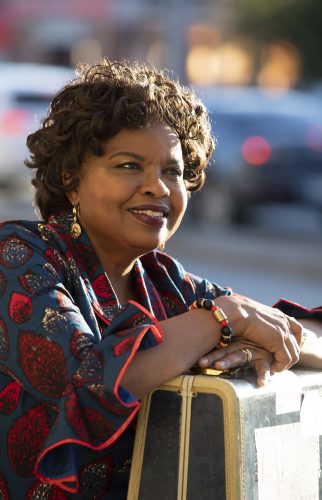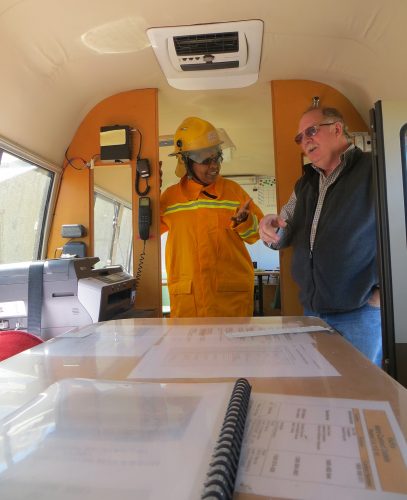
Amiso George, professor of strategic communication, is an expert in crisis communications in countries around the world. Photo by Joyce Marshall
Amiso George Blends Culture and Crisis Communication
The professor has studied training and strategy on several continents.
A fire moved fast near the small town of Kangaroo Ground, near Melbourne, Australia. Amid the hubbub of a dozen firetrucks and about 80 emergency responders stood a petite woman in an orange fire-protection suit and a hard hat.
This time, in October 2012, the blaze was simulated. Amiso Margaret George was there to observe a major crisis-training exercise. Her charge was to provide feedback on communication strategy in the wake of bushfires that devastated parts of southeastern Australia in 2009, killing 173 people.
George, professor of strategic communication at TCU, was a visiting professor at Swinburne University of Technology in Melbourne that autumn. She recommended more collaboration and better interagency communication before, during and after future emergencies.
Indeed, a report from the Australian Royal Commission found that in 2009, ineffective communication among fire, police and government agencies had led to confusion, including sending firefighters to the wrong place.
“They weren’t communicating amongst each other as they should,” George said. “Think us, not me. How do you solve the problem quickly? It’s not the time for individuality.”
As a former journalist, George brings an objective eye to her work. Her nearly 30-year career as a professor, researcher and consultant in crisis communication spans the globe from Australia to Kuwait.
And in the age of globalization, crises are often a worldwide matter.
In the Beginning
While touring a television station in her hometown of Port Harcourt, Nigeria, a teenage George sat in for an absent timekeeper on a children’s game show. Much to her surprise, the manager offered her a job. She soon became a local TV personality.

Amiso George, originally from Nigeria, teaches, researches and consults on crisis communications. Photo by Joyce Marshall
Inspired to study journalism, the daughter of two Nigerian teachers left for the United States. At Ohio University in Athens, Ohio, George earned a bachelor’s degree in journalism, a master’s degree in international affairs and a PhD in mass communication. Before teaching, she worked as a journalist for several years, contributing to Voice of America Africa Service and C-SPAN TV.
Bill Slater, then dean of the Donald W. Reynolds School of Journalism at the University of Nevada, Reno, hired George as director of its public relations program. Later, as dean of TCU’s Bob Schieffer College of Communication, he lured George to Fort Worth as an associate professor of strategic communication. In 2005, she was the first TCU faculty member to specialize in the then-burgeoning specialty of crisis communication.
The field of strategic communication “has grown quite rapidly, and [George’s] specialty adds another dimension,” Slater said.
“Amiso had a foot in a lot of different worlds — professional public relations, international research, international public relations,” said Tommy Thomason, professor emeritus of journalism. “It’s very difficult to find someone like her because we academics tend to be specialists in one particular area.”
George said joining TCU provided a chance to work with masters in her field, such as Douglas Newsom, who was the university’s first full-time strategic communication professor in 1969.
“I have brilliant colleagues, but it’s not a dog-eat-dog environment,” George said about TCU. “You can’t be a laggard. You can’t not strive for excellence.”
George epitomizes those high standards. In 2017, the Public Relations Society of America named her its Outstanding Educator of the Year.
An International Footprint
George’s global research includes topics ranging from communications with survivors of the Mariana mining disaster in Brazil and Boko Haram victims in Nigeria to climate change to the theory of apologizing.
Her ability to see beyond theory to practical applications has made her a sought-after expert by newspapers, TV stations, businesses and nonprofit organizations. Media outlets often feature her as a crisis communication expert in the wake of notable emergencies. She weighed in on the response of a restaurant chain to the 2015 killing of nine motorcycle gang members at its Waco, Texas, location. She also dissected how Texas Health Presbyterian Hospital in Dallas handled the Ebola crisis in 2014.

In 2012, Amiso George observed a training exercise in Australia designed to simulate the massive fires that devastated the area in 2009. She provided feedback on how communications had been handled during the crisis. Courtesy of Amiso George
In Malaysia, George has been consulting with Universiti Tunku Abdul Rahman since 2015. Biennial visits have helped her understand how the country’s culture influenced the government’s initial response to the disappearance of Malaysia Airlines Flight 370 — and its 239 passengers and crew — on March 8, 2014.
“What was not done right in the eyes of the world was that information was not forthcoming on a regular basis initially,” George said.
The mystery of the vanished plane has not been solved, and conspiracy theories abound.
Malaysia’s reaction to the disaster was “all about saving face,” she said. “You don’t criticize openly, and you don’t criticize your superiors openly.”
While teaching in Australia in 2012, George got the idea for a book about the role of culture in crisis communication in non-Western countries. She suggested it to Kwamena Kwansah-Aidoo, then associate dean, international at Swinburne. They ended up co-editing Culture and Crisis Communication: Transboundary Cases From Nonwestern Perspectives (Wiley-IEEE Press, 2017).
“I have a very high opinion of Amiso as a scholar of international repute who has significant international research and teaching experience,” said Kwansah-Aidoo, now rector of the Ghana Institute of Journalism in Accra. “She has a vision for advancing public relations research and practice on the African continent.”
For their book, George also wrote a chapter on how Nigeria was able to contain the 2014 Ebola outbreak to nine deaths in three months while other West African countries struggled to control the virus. She credited the Nigerian government’s rapid response and powerful multimedia risk-communication campaign, which incorporated elements of the local culture, with helping to stem the spread of the virus.
Nigerians are skeptical by nature, but they tend to believe trusted religious or community leaders. So the campaign asked such leaders — and popular entertainers — to help educate the public and counter fear and misinformation. The campaign also printed and broadcast preventive messages in multiple languages and local dialects to thwart the spread of what George calls “false narratives,” or rumors and misinformation that can create chaos.
“One of the false narratives in Nigeria was if people drank salt water it would cure Ebola,” George said. “People believed it. The government put out a public campaign saying it wasn’t true.”
Closer to Home
George likened the coronavirus pandemic to the Ebola outbreak in terms of false narratives and the role of culture in crisis communication.
“Think us, not me. How do you solve the problem quickly? It’s not the time for individuality.”
Amiso George
In China, George said, top officials withheld information, and the police arrested citizens for speaking out about the virus.
“We see how important getting out accurate and consistent information is and how rumors and fake news can really confuse people,” George said. “Leadership is very important in times of crises because we look to our leaders to set the tone and direction we should take. If leaders do not engender confidence, it is problematic.”
In an example closer to home, George said that the communication strategy was effective when the rector of her church, Trinity Episcopal in Fort Worth, became the first diagnosed COVID-19 case in Tarrant County.
While the Rev. Robert Pace ’90 MA self-quarantined, the church closed. George helped craft a statement to parishioners and a social media announcement “to state the facts, but not create panic,” she said. Pace even posted an open and honest letter on the church’s website, describing his symptoms, explaining church decisions and giving advice to parishioners along with links to research articles.
“Parishioners called and texted thanking the church for the factual information,” George said. “Be truthful and be honest with your targeted audience, even if it’s bad news.”
Return to Nigeria
George’s latest work took her back to Nigeria to study the role of storytelling after a crisis.
“Storytelling is an integral part of the Nigerian culture because of the oral traditions of its people, [but] the oral tradition wasn’t documented,” she said.
For a book about the victims of Boko Haram, a militant group in Nigeria, George planned to travel to a displaced persons camp in Abuja, the capital of Nigeria, to interview victims in 2018. The trip was canceled after family and friends voiced safety concerns. That book is on hold, but George isn’t giving up.
“The key is finding fixers — contacts — who can pave the way,” she said. “It’s not your traditional approach to research, and that’s OK. It’s a different part of the world with a different approach needed.”
“The key is finding fixers — contacts — who can pave the way. … It’s a different part of the world with a different approach needed.”
Amiso George
That experience led George to study why crisis and risk communication is done so differently in Africa. George and Audra Diers-Lawson, a senior lecturer in public relations and journalism at Leeds Beckett University in England, are developing a crisis communication theory specific to African cultures.
“Beyond looking for mere outcome-oriented measures of crises and their effects on different populations, Amiso is interested in capturing the crisis experience and what can be learned from crises,” Diers-Lawson said. She came to the realization about the same time as George that existing crisis communication theories from a Western perspective may not work in other parts of the world. They decided to explore the reasons and possible solutions together.
“To understand why [African cultures] respond differently to crises, we have to understand the backstory,” George said. “How does the culture respond to issues? How does the culture acknowledge issues? What is even considered a crisis?”
Often in African cultures, people are indirect and use parables when they speak, George said. In Nigeria, for example, don’t expect public apologies, especially from men, but she said they can “show contrition through action.”
“Let’s say a village chief does something wrong,” George said. “It’s unfathomable for the person to give a public apology, but he can show how sorry he is through expensive gifts, like land or jewelry, and a delegation to take the gifts to the aggrieved person.”
A Model Teacher-Scholar
George’s insights about how non-Western culture influences communication have helped shape her research and teaching at TCU, where her courses combine theory and practice.

Amiso George holds an old suitcase that symbolizes, for her, travel and connecting with people from different cultures. Photo by Joyce Marshall
“It was very impressive how she interacted with students, gave advice and injected confidence in them,” said Uche Onyebadi, chair and associate professor of journalism, who sat in on George’s Research Methods class last year. “There are some people who bring something extra to the table — she belongs to this group.”
George’s student circle is set to expand. Longtime crisis communication textbook author Kathleen Fearn-Banks, an associate professor in the University of Washington’s Department of Communications, picked George to gradually assume the writing of the textbook Crisis Communications: A Casebook Approach (Routledge, sixth edition, anticipated fall 2020). George’s name will appear as co-author of the sixth edition.
International travel restrictions related to the coronavirus delayed George’s plans this autumn to go to Kyrgyzstan as a Fulbright scholar. She still hopes to travel to Bishkek, the capital, to help develop the communication curriculum for the American University of Central Asia’s business and journalism departments.
Travel plans aside, the tumult of 2020 reinforced the importance of her global work.
“I want to emphasize the transboundary nature of crises,” George said. “If a crisis starts in one country, it doesn’t stay there. We travel more, we have different ways of contacting each other.”

Your comments are welcome
25 Comments
Congratulations Dr Amiso. I am very proud of you. Keep up the good job
Congratulations Dr. Amiso. You never cease to amaze me with your grace and Intellect, be well and stay safe!
FELICITATIONS … Quite happy your work is being recognized.
Open-mindedness and curiosity while traveling the world makes one so much more aware of local specificities and what they imply.
“Les voyages forment la jeunesse” / ” Travels shape the young” as the saying goes ; but not only… when one like you looks around, tries out new things – ratatouille, tapenade and pastis, and also para-gliding in the Alps while camping out !!! the result is YOU, who’s sharpened up your understanding of cross-cultural communication.
Keep it up, Congrats !
Congratulations, Dr. Amiso! I remember hearing one of your reports on a VOA Africa Service broadcast on a warm evening in Mogadishu, Somalia in the 1980s. When you signed off, I told myself “she will go far.” And, so you have! Your standards of excellence and openmindedness have served you so well throughout your amazing career. They can only continue to do so when you finally arrive in Kyrgyzstan. Well done!
Amazing talent. Dr. George keeps learning and staying relevant to pressing issues that inform crisis communications and its evolving needs.
Great job Dr. Amiso
We should always be proud of women like you.
Congratulations Dr. Amiso, you are epitome of knowledge and a communication expert. We met at Leeds during a working on crisis management and i was drawn to you for your extreme wealth of knowledge and exposure, even after our meeting you still kept in touch. I am very proud of you and we hope to have you back in Nigeria soon to address Female Journalists soon.
Adeola Ekine
Chairperson, Nigeria Association of Women Journalists, Lagos State Chapter.
Great Dr. Amiso. I am so proud that there is a woman like you. My greetings and congratulations.
I am indeed so proud of you, Professor Amiso! Your visits to Universiti Tunku Abdul Rahman (UTAR) have been a very fruitful one in helping us in developing our course. We will look forward to you visit in future again!
Prof. Amiso, Congratulations? You are a great achiever. Your dedication and hard work will always inspire us. We are so proud of you.
Prof. Amiso, Congratulations! You are a great achiever. Your dedication and hard work will always inspire us. We are so proud of you.
This beautifully written article by Sheryl is a true reflection of Professor Amiso George’s passion for research and scholarship having been honored to work with her on two occasions. I have learnt so much from her. The way she relates with her students, her rigorous search for human angle research in crisis communication and the ease with which she builds and sustains relationships. Prof, be rest assured that you’ll get the needed linkages with appropriate contacts for the book on Boko Haram sect whenever you are ready, and safely too. Best regards
Thanks, TCU magazine, for publishing this story. And many thanks to Dr. George for devoting her research to this highly relevant and important research area, and bridge together crisis communication and culture. Living in a global and interconnected world we still need to understand how to plan and implement effective and, importantly, harmonious communication in times of crisis.
Way to go!
I have known Amiso for almost forty years. We met in graduate school at Ohio University (a.k.a. Harvard on the Hocking). She was already a celebrity when we met, having already been a newscaster prior to enrolling in grad school. Nevertheless, she honkered down and pursued her academic goals and subsequently her passion for teaching. Over the years, Amiso has brought her classroom to the world and often brought the world to her classroom. Her commitment to research that is practical and usable has set her apart from many academics. I’m optimistic that her research and its place in the crisis process will continue to find relevance. I write this as the media coverage of Hurricane Laura – a category 4 hurricane is expected to make landfall as an unsurvivable storm in some places. Communities and institutions affected by this storm will need your experience to respond to this crisis. Congrats my friend on this truly apt profile which shines a consummate light on your academic work! So proud!
I have known Amiso for almost forty years. We met in graduate school at Ohio University (a.k.a. Harvard on the Hocking). She was already a celebrity when we met, having already been a newscaster prior to enrolling in grad school. Nevertheless, she honkered down and pursued her academic goals and subsequently her passion for teaching. Over the years, Amiso has brought her classroom to the world and often brought the world to her classroom. Her commitment to research that is practical and usable has set her apart from many academics. I’m optimistic that her research and its place in the crisis process will continue to find relevance. I write this as the media coverage of Hurricane Laura – a category 4 hurricane is expected to make landfall as an unsurvivable storm in some places. Communities and institutions affected by this storm will need your experience to respond to this crisis. Congrats my friend on this truly apt profile which shines a consummate light on your academic work! So proud! Hope to see you when you are in my neck of the woods for your Full right work.
Well done mate; continue to keep the fire burning!
I am beyond happy to read an article that enlightens your accomplishments. I wish you many more. I am so very proud of you. Keep up the great work.
Congratulations Amiso! You understand so well the link between culture and communication. When I was a Peace Corp volunteer in Micronesia, our motto was relationship before task. Yes we were there to “do a job” but if you don’t take the time to understand the people, culture and how and who to communicate with, nothing will get accomplished. Continue to educate, continue to grow.
Prof. Amiso, this article made me more more proud of coming in contact with you.
The article has revealed much more about you than I had known. You are very important to our world.
Apart from your research excellence and amazing achievements, this story forgot to tell how kind you are in terms of donation of educational resources to libraries. Hope you keep doing good for humanity.
Alilonu Angela
Librarian
Pan-Atlantic University, (Main Campus)
Lagos Nigeria
Congratulations My Professor on your accomplishments and most importantly on the lives of those you have touched with your work across our global community at large. It’s truly obvious that you are passionate about what you do, leaving your comfort zone to reach out to many through your calling which radiate as well as contagious to anyone that have the opportunity to meet you in person. It’s truly quite an honor to be a friend.
This is a brilliant success story of a woman of focus
This is a brilliant success story of a woman of focus and positive passion. I congratulate Prof. George on her accomplishments and outstanding contributions to the field of communication and education generally. Her zeal is still very strong and much more is expected from her. Best wishes.
Dear friend Amiso Margaret George, my Doctoral degree colleague at Ohio University, now scientific research colleagues! Thank you for being this enlightened person, always very competent and efficient in everything that you do! This is a wonderful publication! One can tell your excellence both through your story and also through your constantly being internationally recognized! Congratulations! We salute your life! We salute you! Sincerely, Regina and Wainer Silva
I’ve known Dr. Amiso for quite few years now. I’ve never been able to take a course with her. But we are working on a paper together. She is great mentor, teacher, and above all a human being. She has a golden heart and feel for real issues we face in this world. She is an amazing human being and I think this is more important than anything titles we hold in our personal or professional lives.
Excellent Prof. You’re right. Different environment deserves different approach. Research gives such a flexibility. I am very proud of your work ethics. I have worked with you on at least two projects and your passion was legendary. I am very proud of you. Please keep the flag flying. My regard to the family that has supported you in being a shining example to the world.
Related reading:
Features
‘Come From Away’ Inspiration Beverley Bass Tells Her Story
An American Airlines pilot got diverted on 9/11, and her story has landed on Broadway.
Alumni
Dennis Shingleton Uses Councilman Position to Battle Coronavirus
Decades of health care experience helped the veteran prepare Fort Worth for Covid-19.
Campus News: Alma Matters
Disaster Preparedness in Health Care
Hospitals must plan ahead or risk short staffing in crises, nursing professor finds.